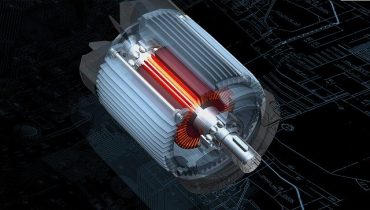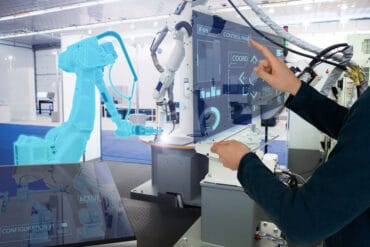
Intelligent manufacturing solutions let companies react faster to issues on a production line or plant and to changing market conditions.
The automotive industry is undergoing rapid changes that are forcing manufacturers to accelerate the adoption of the Industrial Internet of Things (IIoT), big data analytics, artificial intelligence, digital twins, and more. These technologies must be integrated to move to an intelligent manufacturing strategy for industrial production. Such an approach lets auto manufacturers make data-driven decisions that can optimize their operations, reduce costs, and enhance product quality.
Accomplishing these objectives requires that manufacturers leverage Industry 4.0 and the digitalization of the manufacturing process to develop smarter and more connected production systems.
See also: Riding Out Automotive Market Uncertainty with Digital Twins
Factors driving the need for intelligent manufacturing
There are many factors driving the need for smart manufacturing. One of the most important is that auto manufacturers, like all manufacturers, are under pressure to reduce production costs while maintaining product quality. And another factor is that consumers want highly personalized and customized products and rapid delivery of those products. And naturally, auto manufacturers must have the ability to react to market and supply chain changes quickly.
But there is more afoot in the industry. There are changes in the autos themselves that are making smart manufacturing a necessity. They include:
More sophisticated electronics and software: Today’s cars are equipment with many sensors and processors. They also include advanced driver assistance systems (ADAS) and infotainment software. These elements introduce new potential problems.
In the last few years, chip shortages have had major impacts. In 2021, the automotive industry lost more than $200 billion due to chip shortages. Eleven million fewer vehicles were produced. Manufacturing plants sat idle. In 2022, many automakers decided to ship some of their most popular models without all the chips they were designed to include.
On the software side of the equation, many see software delivering the differentiating capabilities to deliver a competitive edge but also creating development challenges. Manufacturers must integrate independent software elements into a comprehensive platform. Solving the challenges related to these complex systems has delayed the production and introduction of new models. And bugs in the software systems have led to class action lawsuits.
Embracement of electric vehicles (EVs): Starting at the design stage, changes need to occur. For example, good aerodynamic properties help a gas-engine car get higher fuel economy. EVs must be optimized for a maximum driving range. There are similarities, but the design process is different.
EVs require new supply chains. The battery systems alone are unique to these new cars. And many EVs use structural elements made of different composite materials compared to traditional cars.
And finally, EVs require new production systems to assemble, build, and test the cars.
Stricter regulatory and sustainability requirements: Governments around the world are enacting new pollution control regulations targeted at reducing auto emissions to help stem the impact of climate change. Besides requiring more fuel-efficient technology, it also pushes the need to transition to the sale of more electric vehicles.
Furthermore, new requirements are emerging to use more sustainable and lightweight materials in the cars themselves. And make the end-to-end production process more sustainable. That means running plants more energy-efficiently and looking at sustainability issues throughout the entire supply chain.
See also: Digital Twins, IT/OT Convergence Drive the Industrial Internet
How smart automotive manufacturing can help
Enter smart manufacturing. Technologies like AI and Industrial IoT can be used to analyze the production and operation of work cells, assembly lines, and entire plants. The application of these technologies can be used to quickly identify and resolve problems.
Many manufacturers are turning to digital twins and virtualization. Specifically, there is growing use of virtualization and digital twins of work cells, manufacturing lines, and entire plants. These virtual representations can help an auto manufacturer spot manufacturing issues and optimize operations before launching a new product. They can also be used for virtual commissioning.
Such solutions let manufacturers react faster to issues on a production line or plant and to changing market conditions. Additionally, with such technology, auto manufacturers do what-if simulations to see how making a change here or there impacts production. The aim of such efforts is to identify the best configuration to establish a flawless launch.
An important side benefit of smart manufacturing is that results are repeatable. Once a manufacturer optimizes a work cell, assembly line, or entire plant, the processes and best practices can be captured and replicated. So, a manufacturer can duplicate or relocate optimized manufacturing lines anywhere in the world.
Where is this all leading to? Besides delivering production benefits, the data generated on an assembly line and within a plant can be used for other purposes.
Manufacturers are tying their operational technology systems with their enterprise systems to optimize spare parts inventory, implement predictive maintenance, and more. Additionally, some are taking advantage of a continuous communication loop where operational data is fed back into a digital twin to enable manufacturing lines that manage themselves to prevent errors, minimize downtime, and produce first-time-right quality parts at launch and throughout the product lifecycle.
Additional Resources

Drive Production Excellence with Intelligent Manufacturing
The automotive industry is facing unprecedented challenges, with rapid change and intense pressure to meet the demands of climate change, regulations, and consumers. Download Now

Modernize automotive factories with Siemens Smart Manufacturing solutions
Discover how automakers can transform their business with Smart Manufacturing solutions using state-of-the-art hardware and software to modernize production lines. Watch Now

Virtual Manufacturing Development for the Automotive Industry
Companies in the automotive industry are pushing to develop the next generation of autonomous, electric, connected, and shared vehicles. View Now







